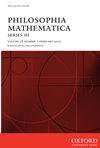无否定直觉数学中的否定
IF 0.6
1区 哲学
Q2 HISTORY & PHILOSOPHY OF SCIENCE
引用次数: 1
摘要
数学家G.F.C.格里斯以他的无否定直觉数学纲领而闻名。尽管格里斯对否定的拒绝被视为其哲学的特征,但这是可执行性要求的结果,即心理建构以主体执行相应的心理活动为前提。将格里斯的可执行性要求恢复到中心地位,可以更微妙地描述对否定的拒绝,据此,D.纳尔逊的强可建构性否定与格里斯的原则是相容的。这暴露了一种否定数学中的“全息”理论,在这种理论中,一个完整的否定理论在假定的否定设置中被“扁平化”。本文章由计算机程序翻译,如有差异,请以英文原文为准。
Negation in Negationless Intuitionistic Mathematics
The mathematician G.F.C. Griss is known for his program of negationless intuitionistic mathematics. Although Griss's rejection of negation is regarded as characteristic of his philosophy, this is a consequence of an executability requirement that mental constructions presuppose agents’ executing corresponding mental activity. Restoring Griss's executability requirement to a central role permits a more subtle characterization of the rejection of negation, according to which D. Nelson's strong constructible negation is compatible with Griss's principles. This exposes a ‘holographic’ theory of negation in negationless mathematics, in which a full theory of negation is ‘flattened’ in a putatively negationless setting.
求助全文
通过发布文献求助,成功后即可免费获取论文全文。
去求助
来源期刊

Philosophia Mathematica
HISTORY & PHILOSOPHY OF SCIENCE-
CiteScore
1.70
自引率
9.10%
发文量
26
审稿时长
>12 weeks
期刊介绍:
Philosophia Mathematica is the only journal in the world devoted specifically to philosophy of mathematics. The journal publishes peer-reviewed new work in philosophy of mathematics, the application of mathematics, and computing. In addition to main articles, sometimes grouped on a single theme, there are shorter discussion notes, letters, and book reviews. The journal is published online-only, with three issues published per year.
 求助内容:
求助内容: 应助结果提醒方式:
应助结果提醒方式:


